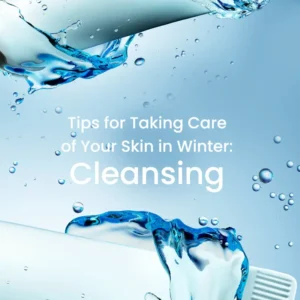Introduction

For skin, the winter months may be rather difficult. It is common for our skin to grow more sensitive, dry, and flaky when the temperature drops and the air gets drier. Maintaining moisturized, radiant, and healthy skin throughout the winter requires a consistent skincare regimen. In this blog article, we’ll walk you through a quick and simple winter skincare routine, ensuring your skin looks its best and is protected from damaging elements.
1. Understand the Impact of Winter on Your Skin

Before beginning the regimen, it’s critical to comprehend how the winter climate impacts our skin. Low humidity, cold weather, and interior heating can dehydrate skin, causing cracks, dryness, and irritation. Your skin finds it difficult to stay hydrated because of the lack of moisture in the air, so having a decent skincare routine is crucial.
The secret is to concentrate on protecting and holding onto moisture. Protective layers will insulate your skin from chilly air and strong gusts, while hydration will keep your skin from getting overly dry.
2. Cleanse with a Gentle, Hydrating Cleanser

The first step in any skincare routine is to cleanse. During the winter, replace your typical cleanser with a gentle, moisturizing one. Harsh cleaners like sulfates or alcohol can deplete the skin’s natural oils, leaving it even dryer. Choose cream- or oil-based cleansers to wash your skin without overdrying it.
Why does this matter?
Cleansing helps eliminate debris, makeup, and pollutants from your skin, but in the winter, you don’t want to lose any important moisture.
Product suggestions: Look for cleansers labeled “hydrating,” “nourishing,” or “cream-based.”
3. Use a Hydrating Toner or Essence

Toners restore your skin’s natural pH balance after cleansing and prepare it for the following steps in your skincare routine. In the winter, it’s best to use a moisturizing toner or essence to offer extra moisture. Alcohol-containing toners should be avoided because they might cause skin to dry out.
Why is this significant?
Hydrating toners or essences provide an extra layer of moisture to your skin during the winter.
Product recommendations: Toners and essences containing hyaluronic acid, glycerin, or aloe vera are ideal for winter hydration.
4. Incorporate a Serum for Deep Hydration

A moisturizing serum is an essential part of any winter skincare routine. Serums are composed of concentrated chemicals that penetrate deeply into the skin, providing hydration as well as other advantages such as brightening and anti-aging. During the winter, consider a serum that concentrates on hydration.
Why does this matter?
During the winter, your skin requires additional moisture, and a serum containing moisturizing elements such as hyaluronic acid or glycerin aids in moisture retention and maintains your skin plump and supple.
Product recommendations: Hyaluronic acid serums are great because they suck moisture into your skin, keeping it hydrated all day.
5. Moisturize, Moisturize, Moisturize!

Moisturizing is probably the most crucial component of a winter skincare regimen. Your skin loses moisture fast in chilly weather, so use a thick, nourishing moisturizer to keep it nourished. If you usually use a mild moisturizer, consider switching to a richer, cream-based moisturizer throughout the winter. Look for moisturizers with components such as shea butter, ceramides, and oils.
Why does this matter?
Moisturizers form a barrier that seals in moisture from your serum and keeps your skin from drying out.
Product recommendations: Cream-based moisturizers with ceramides, shea butter, or natural oils are excellent for keeping moisture in over the winter.
6. Don’t Neglect Your Lips and Hands

Not only can winter be harsh for your face, but it may also cause chapping and drying of your lips and hands. Apply a thick hand cream throughout the day to keep your hands from drying out or cracking, and use a nourishing lip balm to keep your lips smooth and soft.
Why does this matter?
During the winter, your lips and hands require extra protection and hydration because they are more exposed to the cold and dry air.
Product recommendations: For lips, search for balms with components like beeswax, shea butter, or lanolin. Choose a rich, moisturizing hand cream for your hands.
7. Stay Hydrated from the Inside

It’s crucial to moisturize your skin internally as well. Maintaining healthy skin requires drinking a lot of water, particularly during the winter when we tend to drink less. To increase your hydration levels, make sure you’re consuming at least 8 glasses of water each day and think about consuming foods high in water, such as cucumbers, oranges, and watermelon.
Why does this matter?
Drinking adequate water is crucial to maintaining the healthiest possible appearance of your skin because it is a reflection of your overall hydration levels.
Conclusion
Winter skincare focuses on moisture preservation and protection. Follow these simple methods to maintain your skin healthy and radiant all season: gentle washing, moisturizing with serums and moisturizers, and shielding it from harsh weather. Remember to tailor your skincare products to your skin’s changing demands during winter, and don’t forget to hydrate from the inside out!
CLICK HERE FOR MORE INFORMATION
FAQ
1. Why does my skin get so dry in winter?
In winter, cold temperatures, low humidity, and indoor heating can strip moisture from your skin. The air is much drier, which can lead to your skin feeling tight, dry, and sometimes even flaky. It’s essential to adjust your skincare routine to replenish moisture and protect your skin’s barrier.
2. Can I use the same skincare products in winter as I do in summer?
Not exactly. In winter, your skin needs more hydration and protection from the cold. You should switch to thicker, more nourishing moisturizers, and add products that help retain moisture, like hydrating serums or richer cleansers. Some summer products, like lightweight moisturizers, may not provide enough hydration during the winter months.
3. How often should I exfoliate in winter?
Exfoliating once or twice a week is generally sufficient during winter. Over-exfoliating can damage your skin’s protective barrier and make it more prone to dryness and irritation. Stick to gentle exfoliants like lactic acid or mild scrubs to avoid over-drying.
4. Should I still use sunscreen in the winter?
Yes, sunscreen is essential year-round, even in winter. UV rays can still damage your skin, especially if you’re spending time outdoors, and they can even penetrate through clouds or windows. Use a broad-spectrum sunscreen with SPF 30 or higher every morning, even if the sun doesn’t feel strong.
5. Is a humidifier good for winter skincare?
Yes, a humidifier can help significantly. It adds moisture to the air in your home, counteracting the drying effects of heating systems. This can help prevent your skin from becoming too dry and flaky during the winter months.